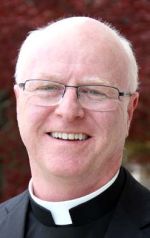(See the readings for the 29th Sunday in Ordinary Time, Oct. 18)
The Associated Press ran a short news flash on July 29, 1981 that read: “Kuhmo, Finland – A British musician tripped and fell on his $250,000 Stradivarius violin, breaking the rare instrument’s neck during in intermission at a local chamber music festival. First violinist Peter Cropper of the British Lindsay Quartet was descending stairs when he tripped over the violin, which was insured.”
The story, however, does not end there. Peter was devastated by the accident. The Stradivarius was one of those rare hand-crafted instruments coveted for the beautiful sound it produces in the hands of a skilled musician. He took the violin to a master craftsman to see if, in his vain hope, it could be repaired. The craftsman worked on it with tremendous care and eventually returned it. The sound was perfect. What was once thought irreparable was not only repaired, it was better than when it was first crafted.
The story resonates with our celebration of the liturgy today. Jesus says: “For the Son of Man did not come to be served but to serve and to give his life as a ransom for many.” Jesus refers to his offering as a “ransom.” The term is another way of expressing “redemption.” Jesus redeems us.
Mankind was broken by sin. Jesus’ self-offering was the means by which we have been “ransomed,” “redeemed,” or “healed.” The sin of man that originated at the time of creation occurred when man turned away from God, specifically God’s will, and served himself. The damage seemed irreparable. Covenants were established but the healing was never complete.
[hotblock]
Isaiah prophesied that one day God, in his mercy, would act in a definitive way to heal what was broken in man. Man would be redeemed from his sin and ransomed from death. Isaiah speaks of the suffering servant by whom redemption would be accomplished. He says: “If he gives his life as an offering for sin, he shall see his descendants in a long life, and the will of the Lord shall be accomplished through him … through his suffering, my servant shall justify many, and their guilt he shall bear.”
Jesus is the fulfillment of this prophecy. The Letter to the Hebrews highlights this as the author seeks to encourage his readers to “hold fast to our confession [of faith].” He writes: “For we do not have a high priest who is unable to sympathize with our weakness, but one who as similarly been tested in every way, yet without sin. So let us confidently approach the throne of grace to receive mercy and to find grace for timely help.”
God himself takes on humanity in his Son. He becomes one of us and through his self-offering mercy heals us. He is the one to whom we turn for strength, consolation, direction and repair. So we join our voices saying: “Lord, let your mercy be on us, as we place our trust in you.”
Going back to the Gospel passage we see another aspect of God’s healing work, which is our participation in the work of redemption. Jesus calls us to discipleship, to follow him. The interchange between himself and the brothers Zebedee remind us that we too, as disciples, are called to lay down our lives in service. James and John are seeking glory and honor — one sitting at the right, the other at the left of Jesus. When Jesus asks James and John “can you drink the cup that I drink or be baptized with the baptism with which I am baptized?” he is asking them, “can you participate in the work of redemption?” or “can you too lay down your lives in loving service?”
They immediately answer “we can,” probably not fully aware of what Jesus is asking. So he continues to teach them saying that life as a disciple is not having concern or desire for honor or glory, but a willingness and a longing to serve others. Jesus says: “Whoever wishes to be great among you will be your servant; whoever wishes to be first among you will be the slave of all.”
Peter Cropper thought his Stradivarius was irreparable, broken beyond fixing. He found out otherwise when the master craftsman went to work on the violin.
If we ever think that our lives or aspects of our lives are broken and beyond repair we can look to Christ who, through his mercy, heals and strengthens. If we ever think that the life of our society and culture is broken and beyond repair, we can look to Christ, who through his mercy, corrects and restores. If we ever think that a brother or sister or neighbor is broken and beyond repair, we can look to Christ who, through his mercy, calls us to serve.
***
Msgr. Joseph Prior is pastor of St. John the Evangelist Parish, Morrisville.
PREVIOUS: Readings of the holy Mass – Twenty-ninth Sunday in Ordinary Time
NEXT: Readings of the holy Mass – Thirtieth Sunday in Ordinary Time




Thank you, Monsignor.